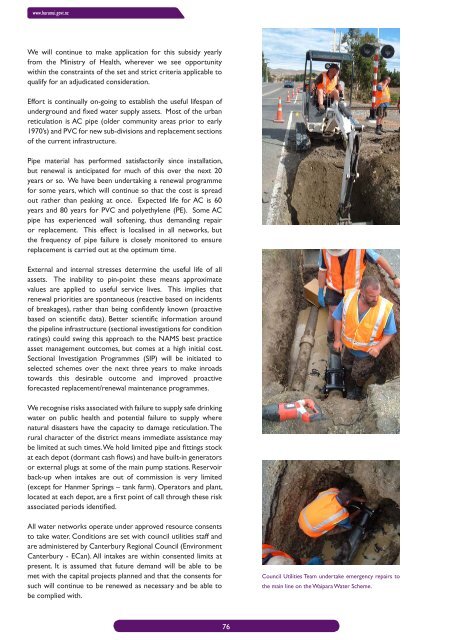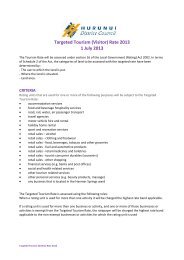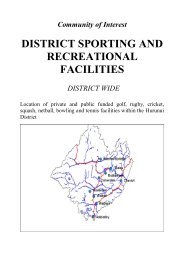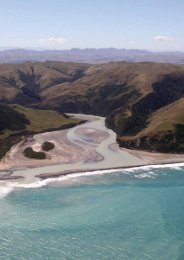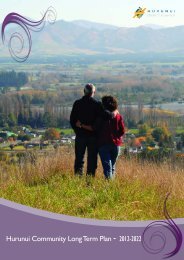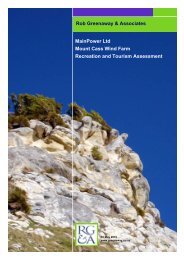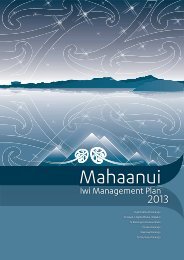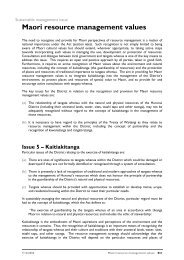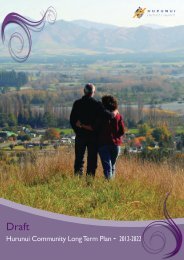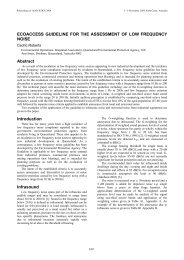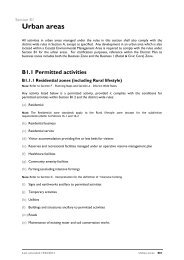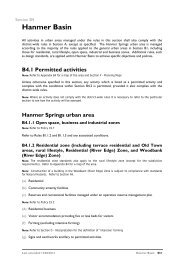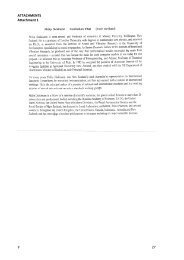Long Term Community Plan 2012-2022 - Hurunui District Council
Long Term Community Plan 2012-2022 - Hurunui District Council
Long Term Community Plan 2012-2022 - Hurunui District Council
Create successful ePaper yourself
Turn your PDF publications into a flip-book with our unique Google optimized e-Paper software.
www.hurunui.govt.nz<br />
We will continue to make application for this subsidy yearly<br />
from the Ministry of Health, wherever we see opportunity<br />
within the constraints of the set and strict criteria applicable to<br />
qualify for an adjudicated consideration.<br />
Effort is continually on-going to establish the useful lifespan of<br />
underground and fixed water supply assets. Most of the urban<br />
reticulation is AC pipe (older community areas prior to early<br />
1970’s) and PVC for new sub-divisions and replacement sections<br />
of the current infrastructure.<br />
Pipe material has performed satisfactorily since installation,<br />
but renewal is anticipated for much of this over the next 20<br />
years or so. We have been undertaking a renewal programme<br />
for some years, which will continue so that the cost is spread<br />
out rather than peaking at once. Expected life for AC is 60<br />
years and 80 years for PVC and polyethylene (PE). Some AC<br />
pipe has experienced wall softening, thus demanding repair<br />
or replacement. This effect is localised in all networks, but<br />
the frequency of pipe failure is closely monitored to ensure<br />
replacement is carried out at the optimum time.<br />
External and internal stresses determine the useful life of all<br />
assets. The inability to pin-point these means approximate<br />
values are applied to useful service lives. This implies that<br />
renewal priorities are spontaneous (reactive based on incidents<br />
of breakages), rather than being confidently known (proactive<br />
based on scientific data). Better scientific information around<br />
the pipeline infrastructure (sectional investigations for condition<br />
ratings) could swing this approach to the NAMS best practice<br />
asset management outcomes, but comes at a high initial cost.<br />
Sectional Investigation Programmes (SIP) will be initiated to<br />
selected schemes over the next three years to make inroads<br />
towards this desirable outcome and improved proactive<br />
forecasted replacement/renewal maintenance programmes.<br />
We recognise risks associated with failure to supply safe drinking<br />
water on public health and potential failure to supply where<br />
natural disasters have the capacity to damage reticulation. The<br />
rural character of the district means immediate assistance may<br />
be limited at such times. We hold limited pipe and fittings stock<br />
at each depot (dormant cash flows) and have built-in generators<br />
or external plugs at some of the main pump stations. Reservoir<br />
back-up when intakes are out of commission is very limited<br />
(except for Hanmer Springs – tank farm). Operators and plant,<br />
located at each depot, are a first point of call through these risk<br />
associated periods identified.<br />
All water networks operate under approved resource consents<br />
to take water. Conditions are set with council utilities staff and<br />
are administered by Canterbury Regional <strong>Council</strong> (Environment<br />
Canterbury - ECan). All intakes are within consented limits at<br />
present. It is assumed that future demand will be able to be<br />
met with the capital projects planned and that the consents for<br />
such will continue to be renewed as necessary and be able to<br />
be complied with.<br />
<strong>Council</strong> Utilities Team undertake emergency repairs to<br />
the main line on the Waipara Water Scheme.<br />
76


